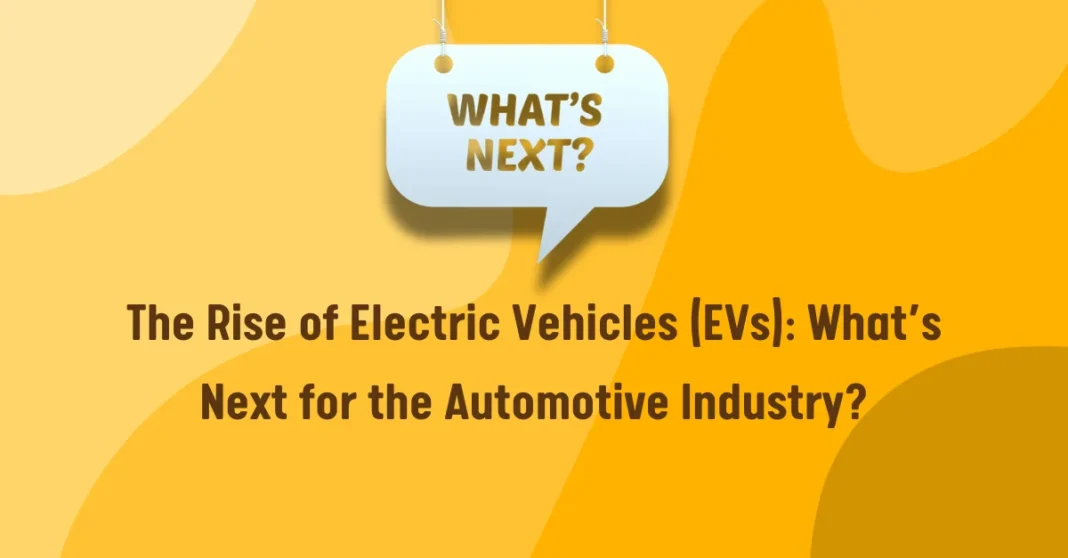The automotive industry is undergoing one of its most significant transformations in recent history, driven by the rapid rise of Electric Vehicles (EVs). With governments pushing for sustainability, environmental concerns reaching a global peak, and advancements in battery technology, the question arises: What’s next for the automotive industry?
1. Increased Adoption and Consumer Demand
As awareness of climate change grows and governments introduce more aggressive emissions regulations, the demand for EVs is expected to rise significantly. Consumers are increasingly drawn to electric vehicles for their environmental benefits, lower operating costs, and cutting-edge technology. Major automakers are already ramping up their production of EV models, aiming to offer a wider variety of choices for consumers. From affordable hatchbacks to luxury sedans and even electric trucks, the market is diversifying rapidly.
2. Expanding Charging Infrastructure
A significant barrier to EV adoption has been the lack of widespread and accessible charging infrastructure. However, governments and private companies are investing heavily in expanding the charging network. Charging stations are being installed in public spaces, workplaces, and along highways to make long-distance travel more feasible for EV owners. Fast-charging technology is also improving, meaning that drivers can charge their vehicles in less time, reducing one of the key hurdles that deter some buyers.
3. Advancements in Battery Technology
Battery technology remains one of the most critical factors for the future of EVs. Currently, lithium-ion batteries are the standard, but there is a growing focus on improving energy density, reducing costs, and increasing the lifespan of batteries. New technologies, such as solid-state batteries, promise to offer higher energy capacities and faster charging times. These advancements could drastically reduce the cost of EVs while improving their range, making them more appealing to a broader consumer base.
4. Environmental Impact and Sustainability
While EVs are seen as environmentally friendly, the environmental impact of manufacturing batteries and sourcing raw materials, such as lithium, cobalt, and nickel, remains a concern. As demand for EVs rises, the industry must address the sustainability of the supply chain, focusing on responsible sourcing, recycling of batteries, and reducing the carbon footprint of production processes. Companies are increasingly looking for ways to make their EVs and the entire manufacturing process more sustainable, from raw material extraction to vehicle disposal.
5. The Shift to Autonomous Vehicles and EV Integration
The convergence of autonomous driving technology and EVs is expected to reshape the future of transportation. Many of the leading players in the automotive industry are investing in self-driving technologies, which pair well with EVs due to their simplified mechanics and electronic control systems. As autonomous vehicles become more viable, they will likely be fully electric, as the cost and environmental benefits align with the goals of EV adoption.
6. Government Policies and Incentives
Governments around the world are introducing stricter environmental policies and providing incentives to accelerate the transition to electric vehicles. These incentives include tax rebates, subsidies, and exemptions from certain fees, making EVs more affordable for consumers. Additionally, many countries have outlined timelines to phase out the sale of internal combustion engine (ICE) vehicles, creating a sense of urgency in the automotive industry to adopt electric alternatives.
7. Market Competition and Innovation
As the EV market grows, competition among automakers is intensifying. Traditional car manufacturers, such as General Motors, Ford, and Volkswagen, are expanding their EV lineups, while newer players like Tesla are leading the charge in terms of innovation and performance. We’re also seeing new startups, such as Rivian and Lucid Motors, entering the market with groundbreaking designs and technology. This competition will drive innovation, improve vehicle quality, and reduce prices, benefiting consumers.
8. The Future of EV Manufacturing and Supply Chains
Manufacturing electric vehicles requires different processes and components compared to traditional gas-powered cars. As EV adoption rises, the demand for specialized parts, such as electric drivetrains and advanced electronics, will grow. Automakers will need to invest in new manufacturing facilities, adopt more advanced robotics, and potentially restructure their supply chains to meet this demand. Additionally, supply chain disruptions could affect EV production, especially given the reliance on specific raw materials for batteries.
9. Global EV Market Growth and Geopolitical Implications
The global demand for EVs is not limited to developed countries; there is also rapid growth in emerging markets. Countries like China, India, and Brazil are becoming key players in the global EV market, driven by urbanization, pollution concerns, and government initiatives. The rise of EVs in these regions will impact global trade dynamics, with a focus on local manufacturing, battery production, and the development of new regulatory standards.
10. The Role of Digital Transformation in the EV Industry
The transition to electric vehicles is not just about the vehicles themselves but also about the integration of smart technologies. Many EVs come equipped with advanced digital systems, from infotainment to real-time data analytics that optimize driving performance. Over-the-air software updates, which allow automakers to improve vehicle functionality without requiring a physical service visit, are becoming increasingly common. The rise of connected cars and digital ecosystems will further enhance the user experience and make EVs more integrated into the broader digital infrastructure.
Conclusion: The Road Ahead for EVs and the Automotive Industry
The rise of electric vehicles is reshaping the automotive industry in profound ways. While challenges remain, particularly around infrastructure, battery technology, and sustainability, the future of transportation is increasingly electric. As automakers continue to innovate and governments push for greener policies, the EV market will likely continue to expand, transforming the industry and contributing to a more sustainable future.
#ElectricVehicles #EVRevolution #SustainableTransportation #FutureOfMobility #GreenTech #ElectricCars #AutomotiveIndustry #BatteryTech

